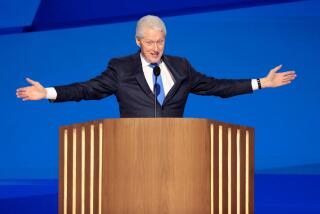My president’s better than yours
- Share via
AT A CANDIDATE forum for trial lawyers in Chicago on Sunday, Hillary Clinton proclaimed that the Bush administration is “the most radical presidency we have ever had.”
This is, quite simply, absurd. But such boob-bait for the Bush bashers is common today in Democratic circles, just as similar right-wing rhetoric about Bill Clinton was par for the course a decade ago. The culture war, it seems, has distorted how we view politics more than we realized. Trust in government is at historic lows, but faith in one’s own “team” remains remarkably durable. (President Bush’s job approval among Republicans is 80%, according to the polling company Rasmussen.)
Only someone suffering partisan amnesia could believe Bush has been a more “radical” president than Woodrow Wilson, under whom antiwar dissidents were thrown in jail and beaten in the streets. Wilson was the first president to openly deride the Constitution, mocking the “Fourth of July sentiments” of those who cared too much about its meaning. Where Bush reaches out to American Muslims and illegal immigrants, Wilson demonized immigrants and “hyphenated Americans” with a venom unimaginable today. “I cannot say too often — any man who carries a hyphen about with him carries a dagger that he is ready to plunge into the vitals of this republic,” Wilson said in 1919.
For much of the 20th century, American conservatives saw themselves as opponents of the imperial presidency, as embodied by Wilson and, later, FDR. (Cato Institute scholar Gene Healy recently explored this on the blog cato-at-liberty.org.) In 1964, for instance, Barry Goldwater cast himself as the candidate against strong-man government. But in the late 1960s and early 1970s, conservatives began to change their tune when the New Deal/Great Society consensus started to unravel and they discovered that the presidency could be theirs. In fact, many conservatives viewed Richard Nixon’s downfall as the product of an unfair double-standard because Democratic presidents had gotten away with metaphorical murder for years.
Liberals who traditionally had seen nothing wrong with strong-man presidencies (Walter Lippmann went so far as to urge FDR to assume “dictatorial powers”) changed their tune under Nixon as well. “Those who tried to warn us back at the beginning of the New Deal of the dangers of one-man rule that lay ahead on the path we were taking toward strong, centralized government may not have been so wrong,” then-California Sen. Alan Cranston conceded at the height of Watergate in 1973.
Steven F. Hayes’ riveting new biography, “Cheney,” recounts a discussion in 1980 at the American Enterprise Institute between two new congressmen, Dick Cheney and Newt Gingrich.
“Congress has been a big part of the problem,” declared Cheney, a veteran of the Ford administration. “A fundamental problem has been the extent to which we have restrained presidential authority over the last several years. Consumed with the trauma of Watergate and Vietnam, we have tampered with the relationship between the executive branch and the Congress in ways designed primarily to avoid future abuses of power . We have been concerned with the so-called myth of the imperial presidency.
“We must restore some balance” between Congress and the White House, Cheney insisted.
Gingrich vehemently disagreed. “What we need is a stronger Congress, not a weaker Congress,” he shot back. “The greatest danger of the Reagan administration is that conservatives will decide they can trust imperial presidents as long as they are right-wing when they are imperial.”
I’d be curious to know if Gingrich still feels that way, now that his hungry eyes seem focused on the presidency. But the Newt of 1980 was definitely on to something. More than a quarter of a century later, most people object to the imperial presidency only when the other party controls the White House.
At Sunday’s trial lawyer conference, for example, Barack Obama proclaimed that “people are tired of ‘Scooter’ Libby justice.” Clinton’s pardons for loyalist Susan McDougal, billionaire tax-evader Marc Rich and bomb-setting Puerto Rican nationalists apparently have slipped down the memory hole. For eight years, the right screamed bloody murder about Clinton’s overreaching. He minted new executive privileges, “accidentally” rummaged through the FBI files of political opponents and sought electronic wiretapping powers — during peacetime — that today are denounced during the war on terror. Some on the right feared we were on a slippery slope to tyranny. Liberals often chortled about such right-wing paranoia.
Today, the dynamic is reversed. Liberals fret over creeping fascism while conservatives give Bush the benefit of the doubt. Both sides are open to charges of hypocrisy, and neither is immune to partisan amnesia. The only consistent crowd are the Libertarians, who distrust all government power.
I wish I had some solution to offer, but my guess is there is none. Indeed, you can be sure that if Hillary Clinton is elected president, someone will denounce her as “the most radical president we’ve ever had” — whether it’s true or not.
jgoldberg@latimescolumnists.com
More to Read
Get the L.A. Times Politics newsletter
Deeply reported insights into legislation, politics and policy from Sacramento, Washington and beyond. In your inbox twice per week.
You may occasionally receive promotional content from the Los Angeles Times.










